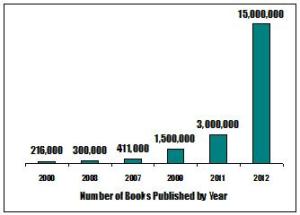In the year 2000, when I was peddling my first novel to agents, I was told that there were 24 million manuscripts submitted that year and only 1% to 1.5% of those would be picked up by a literary agent. Of those picked up, only 65% would score a publisher. I was a one of the lucky ones who got an agent… more on that below.
In the intervening years, due mostly to the changing technologies, the number of books published exploded.
 These figures came from Pat Bertram’s blog
These figures came from Pat Bertram’s blog
In the year I wrote my first novel, 0.009% of those 24 million manuscripts got published. Mine wasn’t. After the joy of obtaining an agent, my world went south when he couldn’t find a publisher. Of course I blamed him, and while he wanted to continue the exclusive contract we had, I was impatient and decided I could get it published myself. And I did. I self-published. Those were the years when self-publishing still had the taint of the “vanity press” label … publishers for those authors who weren’t considered good enough by the mainstream houses, but whose pride (“vanity”) drove them to spend money to get a paperback book published with their name on it. I actually sold a fair number of my book myself, but I digress.
With the stigma of self-publishing virtually gone, it looks like most of my 24 million compatriots of the Class of 2000 have finally found a publisher.
IT WAS THE BEST OF TIMES …
“Hey, Mom and Dad. I know you thought I was crazy when I gave up everything to write the great American novel. I self-published my first book that I titled Like the Firefly Caught in the Rainstorm, I was De-Lighted (and Other Great Puns). I have it here in my hands. It’s got my name right on the cover. I’m gonna be rich and famous.”
IT WAS THE WORST OF TIMES …
“Hey, Mom and Dad. My new book has been out six months and only sold four copies. I’m coming home to live.”
Isn’t this the dilemma most unknown authors face? We have the sores on our butts to attest to the months and years we’ve sat at a desk writing a book, and now are being told the real work is just beginning? Now we have to don our entrepreneurial hat and “sell” our book? Are you kidding me?
That’s a scenario that makes most of us want to find an agent and let him or her do what they do best – sell our book. But then we remember … only 1.5% of all those people out there with finished manuscripts attract an agent.
Being forced to be that entrepreneur if we want to ePub starts to look like the only alternative. But then you look at the numbers (and let’s assume that there were in fact 15 million books published in 2012). One conclusion you can come to is that there must be a lot of really bad books out there. In fact, it’s probably right to assume that with the relative ease of self-publishing, the majority of the books out there are terrible.
And then the worry becomes that as that fact penetrates the consciousness of the consumer, fewer and fewer will be willing to sift through the garbage to find that one nugget – your book. For most consumers, it will become too time-consuming to find the good stuff. It is probably reasonable to assume, then, that in the not too distant future consumers will drift back to asking traditional publishing houses to pick out and bring to market the best manuscripts out there.
OK! With all this deliberation, here is what I decided. After weighing all the evidence above, I am going the Kindle, ePub route. While the “arguments” for and against presented above are equally valid, the tipping point for me came from reading Kristine Kathryn Rusch’s blog. Let me summarize it here, but I urge you to go read it in its entirety. For my money, the best reading on the web if you are interested in getting your work published.
It’s a vision for the long-term. What do you want from your work? If you go the traditional route and get lucky getting published, you will get an immediate monetary reward in return for giving up your work to the publishing house. If you self-publish, you won’t make as much money initially, but since you retain the rights to your work, over time you could make more money. She says you should treat your work like an asset. She gives the example of the person who buys homes to flip them. They make immediate money on the sale, but the house is no longer theirs. What if, she asks, that person bought the home, fixed it up, and then rented it? Retained ownership, over time, could (and most likely would) be worth more money to the owner than flipping it. In any case, you retain ownership of the property and can do what you want with it over time. See your work as an asset. Like buying and holding on to a piece of stock.
I had never thought of my work as an asset. That argument convinced me to self-publish.
Click here to read the first chapter of my new novel One Death Too Far. Haven’t got a publishing date yet, but as soon as I do, you’ll be the first to know.
For book marketing purposes, I am looking for “followers”. If you click “follow” at the extreme bottom right of this page, not only will I be grateful, I’ll even send you the second chapter of my novel free.



Dennis – Good article. If you self-publish, paying only for printing services, you can retain all rights to the book. Your idea of Kindle is fine, because it doesn’t prevent you from using other means, including the possibility of a major publisher seeing your book. The key is “selling” your book. Even agents are interested in what you can contribute to marketing, i.e. speaking, contacts you may have, and name recognition in a particular market. It’s a tough business, but you have a good product.
Ralph Higgins